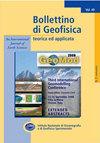求助PDF
{"title":"所谓的先兆:糟糕的预测者","authors":"F. Mulargia, P. Gasperini, B. Lolli, Philip B. Stark","doi":"10.4430/bgta0142","DOIUrl":null,"url":null,"abstract":"Author(s): Mulargia, F; Gasperini, P; Lolli, B; Stark, PB | Abstract: © 2015 - OGS. The destructive 2009 L'Aquila and 2012 Emilia-Romagna earthquakes led the Italian Dipartimento della Protezione Civile (DPC) to fund nine research groups to investigate seismic precursors. Three research groups produced testable predictions by the DPC deadline of May 31, 2013, based on: 1) radon in a well in Friuli, 2) temperature, flow, CO2 flux, and other variables measured in wells in Emilia-Romagna, and 3) an Artificial Neural Network (ANN) algorithm applied to seismicity. We evaluated the geochemical precursors by comparing their predictions to an equal number of predictions at the same locations and with the same individual and total durations as the actual predictions, but at random times. This approach avoids modelling the seismicity, so the accuracy of the predictions is not influenced by the accuracy of any seismicity model. Neither set of geochemical precursors succeeds significantly better than the random predictions. ANN, on the other hand, did not predict any events large enough to affect public safety.","PeriodicalId":50728,"journal":{"name":"Bollettino Di Geofisica Teorica Ed Applicata","volume":"56 1","pages":"351-356"},"PeriodicalIF":0.7000,"publicationDate":"2015-06-01","publicationTypes":"Journal Article","fieldsOfStudy":null,"isOpenAccess":false,"openAccessPdf":"","citationCount":"0","resultStr":"{\"title\":\"Purported Precursors: Poor Predictors\",\"authors\":\"F. Mulargia, P. Gasperini, B. Lolli, Philip B. Stark\",\"doi\":\"10.4430/bgta0142\",\"DOIUrl\":null,\"url\":null,\"abstract\":\"Author(s): Mulargia, F; Gasperini, P; Lolli, B; Stark, PB | Abstract: © 2015 - OGS. The destructive 2009 L'Aquila and 2012 Emilia-Romagna earthquakes led the Italian Dipartimento della Protezione Civile (DPC) to fund nine research groups to investigate seismic precursors. Three research groups produced testable predictions by the DPC deadline of May 31, 2013, based on: 1) radon in a well in Friuli, 2) temperature, flow, CO2 flux, and other variables measured in wells in Emilia-Romagna, and 3) an Artificial Neural Network (ANN) algorithm applied to seismicity. We evaluated the geochemical precursors by comparing their predictions to an equal number of predictions at the same locations and with the same individual and total durations as the actual predictions, but at random times. This approach avoids modelling the seismicity, so the accuracy of the predictions is not influenced by the accuracy of any seismicity model. Neither set of geochemical precursors succeeds significantly better than the random predictions. ANN, on the other hand, did not predict any events large enough to affect public safety.\",\"PeriodicalId\":50728,\"journal\":{\"name\":\"Bollettino Di Geofisica Teorica Ed Applicata\",\"volume\":\"56 1\",\"pages\":\"351-356\"},\"PeriodicalIF\":0.7000,\"publicationDate\":\"2015-06-01\",\"publicationTypes\":\"Journal Article\",\"fieldsOfStudy\":null,\"isOpenAccess\":false,\"openAccessPdf\":\"\",\"citationCount\":\"0\",\"resultStr\":null,\"platform\":\"Semanticscholar\",\"paperid\":null,\"PeriodicalName\":\"Bollettino Di Geofisica Teorica Ed Applicata\",\"FirstCategoryId\":\"89\",\"ListUrlMain\":\"https://doi.org/10.4430/bgta0142\",\"RegionNum\":4,\"RegionCategory\":\"地球科学\",\"ArticlePicture\":[],\"TitleCN\":null,\"AbstractTextCN\":null,\"PMCID\":null,\"EPubDate\":\"\",\"PubModel\":\"\",\"JCR\":\"Q4\",\"JCRName\":\"GEOCHEMISTRY & GEOPHYSICS\",\"Score\":null,\"Total\":0}","platform":"Semanticscholar","paperid":null,"PeriodicalName":"Bollettino Di Geofisica Teorica Ed Applicata","FirstCategoryId":"89","ListUrlMain":"https://doi.org/10.4430/bgta0142","RegionNum":4,"RegionCategory":"地球科学","ArticlePicture":[],"TitleCN":null,"AbstractTextCN":null,"PMCID":null,"EPubDate":"","PubModel":"","JCR":"Q4","JCRName":"GEOCHEMISTRY & GEOPHYSICS","Score":null,"Total":0}
引用次数: 0
引用
批量引用
Purported Precursors: Poor Predictors
Author(s): Mulargia, F; Gasperini, P; Lolli, B; Stark, PB | Abstract: © 2015 - OGS. The destructive 2009 L'Aquila and 2012 Emilia-Romagna earthquakes led the Italian Dipartimento della Protezione Civile (DPC) to fund nine research groups to investigate seismic precursors. Three research groups produced testable predictions by the DPC deadline of May 31, 2013, based on: 1) radon in a well in Friuli, 2) temperature, flow, CO2 flux, and other variables measured in wells in Emilia-Romagna, and 3) an Artificial Neural Network (ANN) algorithm applied to seismicity. We evaluated the geochemical precursors by comparing their predictions to an equal number of predictions at the same locations and with the same individual and total durations as the actual predictions, but at random times. This approach avoids modelling the seismicity, so the accuracy of the predictions is not influenced by the accuracy of any seismicity model. Neither set of geochemical precursors succeeds significantly better than the random predictions. ANN, on the other hand, did not predict any events large enough to affect public safety.


